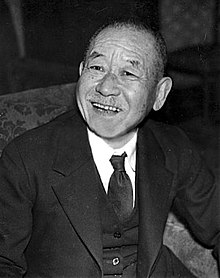Okada Keisuke | |
|---|---|
岡田 啓介 | |
 | |
| Prime Minister of Japan | |
| In office 8 July 1934 – 9 March 1936 | |
| Monarch | Hirohito |
| Preceded by | Saitō Makoto |
| Succeeded by | Hirota Kōki |
| Minister of the Imperial Japanese Navy | |
| In office 26 May 1932 – 9 January 1933 | |
| Prime Minister | Saitō Makoto |
| Preceded by | Ōsumi Mineo |
| Succeeded by | Ōsumi Mineo |
| In office 20 April 1927 – 2 July 1929 | |
| Prime Minister | Tanaka Giichi |
| Preceded by | Takarabe Takeshi |
| Succeeded by | Takarabe Takeshi |
| Personal details | |
| Born | 20 January 1868 Fukui, Japan |
| Died | 7 October 1952 (aged 84) |
| Political party | Independent |
| Alma mater | Imperial Japanese Naval Academy |
| Profession | Admiral |
| Signature |  |
Okada Keisuke (岡田 啓介, Okada Keisuke, 20 January 1868 – 7 October 1952) was a Japanese admiral and statesman who served as Prime Minister of Japan from 1934 to 1936.
Born to a samurai family in the Fukui Domain, Okada became an officer Imperial Japanese Navy and served during the First Sino-Japanese War and the Russo-Japanese War. After reaching the rank of Admiral, he served as minister of the navy under Prime Minister Giichi Tanaka from 1927 to 1929 and under Prime Minister Makoto Saito from 1932 to 1933.
Okada was appointed prime minister to succeed Saito in 1934. A moderate who attempted to restrain the rise of militarism, Okada was among those targeted by a group of rebel officers in the February 26 incident of 1936. Okada narrowly survived, but resigned in the aftermath of the incident.
As a senior statesman during the Pacific War, Okada was a central figure in efforts to oust Prime Minister Hideki Tojo and seek peace with the allies.